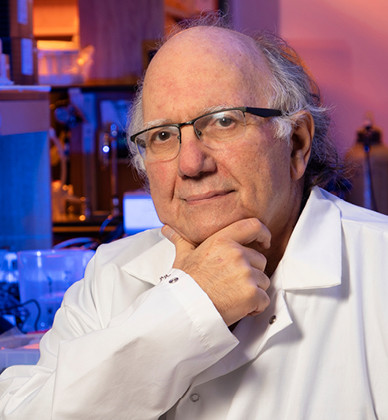Rafick Sekaly, Ph.D.
Immunopathogenesis
Emory University
Recruited: 2020
Rafick-Pierre Sekaly’s research focuses on developing an understanding of the immune response that is triggered by a natural infection, vaccine or immune-based therapy; Sekaly and his group will use that knowledge to develop better treatments and immune-based interventions for diseases such as AIDS and cancer.
For over two decades, Sekaly has studied a wide range of interventions and treatments and their effects on the immune response in the host. His findings have been used to predict what’s likely to work in medicines and vaccines used to prevent or treat illnesses.
Sekaly’s pursuit of a cure for HIV is a hallmark of his career, and one contribution in particular could prove to be a game-changer.
A certain cell, CD4, is HIV’s prime target in the blood. CD4 unleashes the killer cells (CD8) that go after viruses — but because HIV attacks CD4, these defenders are never released. Sekaly and his team have genetically engineered CD4 cells to make them immune to HIV’s assault. When injected into the body, these new CD4 cells can produce enough CD8 killers to attack and control HIV.
In 2020, NIH awarded Sekaly an $11 million grant to test his approach in a clinical trial. Currently, HIV treatments reduce the amount of virus in the body, thus holding the virus in check and preventing AIDS. But because some virus remains, treatment must be lifelong. Sekaly believes his engineered cells can finish off the remaining HIV virus, a feat that would amount to a cure.
Sekaly is taking a similar approach to cancer treatments. His first targets are blood cancers, such as leukemia or non-Hodgkin's lymphoma. Immunotherapy is currently used for cancer treatment, introducing cells into the body that will attack the tumor cells. However, the introduced cells don’t remain in the body long; they’re not around when the cancer cells start reproducing again. Genetically engineered cells could last longer, remaining in the body to attack whenever the cancer cells become active again, helping eradicate the cancer.
In 2020, Sekaly began applying his broad immunological experience to support scientists working on cures and vaccines for COVID-19. Understanding the body’s immune response to COVID-19 is crucial: In many cases, it’s the immune response that becomes fatal and not the virus itself. Knowing who responds well to vaccination can help enhance the immune response of those who don’t.
He has published more than 340 peer-reviewed articles in scientific journals and holds 25 patents. GRA support has also helped Sekaly set up a company to expand his work on cancer.
Research
- Antigen-specific immunological memory in non-human primatesand human systems
- Transcriptional networksthat regulate the generation and maintenance of CD8 and CD4 T-cell and humoral immunity, including senescence and the TGF beta pathway
- Understanding of mechanisms of action of co-inhibitory receptors in T cell homeostasis, T cell exhaustion and in treatment of cancers and HIV infection
- Defining mechanisms of action of microbiome and metabolome on vaccines and immune based therapies
- Development of novel long lasting cell-based therapies based on a novel subset of T cell stem cells in cancer and HIV infection
- Development of predictors of successful long-lasting vaccination in low-income countries
Choosing Georgia
“The environment here at Emory is fantastic. We have, on the same site, the Emory Vaccine Center, a non-human primates lab, a cancer center with its revamped cell-based therapy facility and a really strong clinical trials group. These are all great ways to attract great scientists. And everybody is stellar. This is an environment I really thrive in.”

